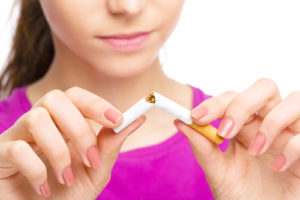 If you smoke or vape with e-cigarettes, chances are someone in your life has been begging you to quit. But did you know that patients who want to get a plastic surgery procedure are also asked to quit? Of course, we want you to quit for your own health, but vaping or smoking before or after plastic surgery can cause dangerous complications such as skin flap failure. Here’s why quitting before you go “under the knife” could save your surgical results, and maybe even your life!
If you smoke or vape with e-cigarettes, chances are someone in your life has been begging you to quit. But did you know that patients who want to get a plastic surgery procedure are also asked to quit? Of course, we want you to quit for your own health, but vaping or smoking before or after plastic surgery can cause dangerous complications such as skin flap failure. Here’s why quitting before you go “under the knife” could save your surgical results, and maybe even your life!
Smoking
In addition to being bad for almost every part of your body, smoking does something that’s pretty dangerous when you’re undergoing plastic surgery: It reduces blood circulation throughout the body. Smoking reduces the circulation even when you’re not undergoing surgery, but in a post-operative patient, that circulation is crucial to the healing process. Circulation helps prevent blood clotting and improves survival rates of skin flaps. If killed, skin flaps can turn black and fall off your body, leaving permanent damage and scars.
Vaping
Touted as a “safer” alternative to smoking traditional cigarettes, smoking e-cigarettes, or “vaping,” isn’t any safer when it comes to plastic surgery. That’s because most of the fluid used in vaping still contains nicotine, the chemical responsible for restricting the blood circulation. And while we’re on the topic of vaping, studies have also shown that while the fluid used in vaping is less staining to the teeth, it can still cause significant harm to the body thanks to that nicotine. In fact, some of the fancy flavorings used to enhance the vaping fluid have even been shown to make the effects of the nicotine worse on the body than they are with traditional cigarettes!
Quitting: Four Weeks, or Forever?
The minimum amount of time we want you to stop smoking or vaping prior to your surgical procedure is four weeks. Obviously, quitting is hard. If it weren’t, everyone would do it and there wouldn’t be much need for e-cigarettes, and the smoking- and vaping-cessation market wouldn’t be expected to reach $21.8 billion by the year 2024. But if you really want the best results from your surgery, you need to stop both for at least four weeks.
And if you can stop for four weeks, why bother starting again after? After all, what better way to keep your skin looking younger and healthier, your teeth whiter, your breath fresher and your lungs stronger than to quit smoking once and for all?
To learn more about pre- and post-op requirements, or to schedule a consultation with Dr. Bruce Chau, please call 888-966-9471.
